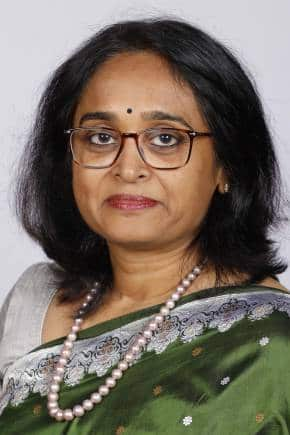



While it has become easier for women to enter the workforce, remaining there is still a challenge. The biological clock is often in conflict with the career clock, making it hard for many women to continue working their way to the middle and top management. But these four leaders of TCS, India's largest software exporter and one of the world's most valuable IT companies, have beaten the odds.
Moneycontrol’s Chandra R Srikanth spoke to four of TCS’ top women executives, who have managed to stay, grow and become leaders to learn more about the journey and the career moves that helped them stay the course and the lessons that aspiring women leaders can learn from them.
Featuring




Prabha, I was just going through the stats and TCS has almost 50 percent women at junior levels. Even at the leadership level, it is 13 percent, which is better than what some other companies have. So, what was the journey like?
Prabha Thomas
I have been with TCS for decades. It has been 27 years now. I joined this company right after my MBA. I joined from the campus. When I joined, we were around 3,000 people. Today, we are talking about 4.6 lakh people. I’ve seen the company grow from the day I was a trainee to where I am today… it has been a phenomenal journey and we have seen the different stages of how the company has grown.
I’ve had the opportunity to work in very many different fields. In those days, more than 25 years ago, you didn't have many career streams or definitions of career streams. So, you start in the technical field as a programmer. Then I moved into project management and account management roles. I worked in multiple cities in India and did a little bit of on-site. It’s almost like every three years I changed my job. So it gave me a chance to do different things every three years.
It has allowed me to see the company from very many different angles, see the organisation, understand business, and it today gives me a perspective of how the whole business is run.
Twenty seven years …that means you would have worked with all four CEOs that TCS has had in its history…
Prabha ThomasYeah, that’s right.
MoneycontrolShalini, take us through your own journey, you head a P&L function. Like Prabha, have you also come to this after a series of roles?
Shalini MathurI have been with TCS for exactly three decades now. I lead the public sector business for TCS across major markets, other than India and the US. I joined TCS as a Programmer Analyst and have grown through various roles. You grow with the organization… I’ve pretty much grown with the organization. There has never been a dull moment and I’ve taken on a lot of challenging opportunities that have come my way. A couple of years ago, I took on the challenge of leading India’s largest and most successful transformation programmes -- Passport Seva. So, I think it has been a fantastic journey.
MoneycontrolSo, we have to thank you for the smooth delivery of passports...
Shalini MathurI think it has been a great success and I think that’s what motivates you, right? I think it’s the challenges that you take on and the opportunity to do something every now and then, to learn something new, and that’s how you grow, both professionally and personally.
MoneycontrolLeena and Shilpa, you are really in the cutting edge of technology. Leena, you work with startups, with academia, and Shilpa, you head an AI-powered product called Optumera. How interesting or challenging is it to work on these new tech or future tech initiatives in a company as large as TCS? Why do this in TCS instead of in a startup?
Shilpa RaoIt's a very interesting question. I would say we are like a startup within TCS. It actually started as a startup journey, right? So it started with a bright eureka moment, and this was when I was working on my very first project in the UK. At that point, I used to spend a lot of time waiting for a bus in a grocery store.
Every day, one of the store associates used to throw away, like boxes and boxes of ready meals. And the reason that he told actually became the idea that started Optumera. We got our initial buy-in and we participated in a lot of client hackathons. So, that was exciting, to get the initial funding to get started with the product. What started as an idea has now grown into a full-fledged suite and it has delivered fantastic business benefits to customers.
Moneycontrol
So, you’re an intrapreneur, so to speak?
Shilpa RaoAbsolutely.
Moneycontrol
What about you, Leena?
Leena WalavalkarWhen you’re working at the cutting edge of technology, there is never a dull moment, especially when you’re shouldering a responsibility of giving that kind of a technology foresight to the organisation.
So, I started very much as a researcher in the innovation lab in TCS. So, rolling up the sleeves, hands-on coding and really getting close to technology all the way now to actually deciding the sort of the strategic direction that we should take in terms of future products and services, and also building a very well- balanced portfolio are all based on the outcomes of IT and innovation. So, it has been an exciting journey throughout.
MoneycontrolPrabha, a few years ago, I think it was Indra Nooyi who said that women can't have it all because the biological clock is at conflict with the career clock. As someone who has spent 27 years in an organisation, can you share in terms of coping mechanisms, and how you managed to stay the course throughout?
Prabha ThomasI think once you cross five years, 10 years, and you have a family, things really start getting challenging for women, and, I guess, it’s the same for men, too, in some ways.
Now, the question is can women have it all? I strongly believe that if you want it, you can, but you may not get it all at the same time. You may have to prioritise what you need today or tomorrow or next year, but the important thing is it’s something you really want to do.
There has to be a support system obviously, nobody exists alone or can work alone -- whether it's at home or in the office. So, definitely, having a team -- when I say a team, at home, it's your family … your spouse, your children. You may have to do a little bit of give and take, but I think in the long run, if you know what you really want and what's the priority for you, you will act in that manner and get what you want.
The other point is that there are things you have to accept, maybe you have to outsource some of your work. This is especially on the personal side and that's okay. Now if you feel that, ‘no, I only should cook and I only should clean and I only should do my office work and I should teach my kids, if you have that, it is going to be a bit difficult.’ It's okay to outsource. Thankfully, we are in India, where we get a lot of help, at least most of us. So use the help that you can get.
MoneycontrolShalini, the thing is we are so often told that women are the best multitaskers in the world. So we end up believing that we can do everything. You have to score a 100 in whatever you do, otherwise this guilt syndrome creeps in, because I think multitasking is often confused with doing everything.
Shalini Mathur
I think a lot of it is imposed upon ourselves by ourselves. And we want to be superwomen. We want to do everything, ‘I want to do the best and I believe only I can do it right’… so that is something, you know, is a syndrome that we all women typically tend to have.
But we need to decide on our priorities. In my career, I believe it’s the same for a man and a woman. Very often, if the wife is not well, the spouse needs to take a day off … or if the mother is not well or the child is not well. In my case, I have been lucky. I have had a very good support system, definitely at home. I have my mother-in-law and I have had situations where I have made a choice. I have travelled abroad with my little son when he was very young, and I just took my mother along with me once. Once I took my mother-in-law along with me. You learn how to live or how to balance what you want to do and how you want to do it. And I think each one has to make that choice for ourselves.
Moneycontrol
Prabha, I think you wanted to add a point here...
Prabha ThomasYou see as women, all of us, at some point of time or the other, have felt guilty. It's okay to feel guilty, that's okay. It happens. That's a natural thing. Sometimes, it’s the environment we have been brought up in. But the most important thing is that guilt should not last beyond a day. I tell this to many of my mentees who talk to me, never feel guilty about being a working woman. Children of working mothers grow up to be very independent and I think they really take pride in seeing their mothers… what they have achieved and what they have done.
Moneycontrol
Leena, in terms of remote working, is it going to lead to more female participation in the workforce? Because increasingly, women around the world are perhaps working harder. How do you see this playing out?
Leena WalavalkarI think being able to better manage time is becoming possible because of technology and remote working. And in many other ways, it has created a level- playing field now. So, if you look at it from that perspective, certainly, it will encourage more women to join and it will encourage more women to stay, because many of them in the act of balancing their responsibilities at work and at home prefer to dedicate their time to one or the other. I think that balance has become much more feasible now. So, we do expect a lot more women to be able to stay. As long as there are opportunities, I think there is no limit in staying or growing in the organisation.
MoneycontrolShilpa, I think it was Sheryl Sandberg who said a few years ago that the most important career decision a woman makes is who she decides to marry. How relevant is that today, because there is increasing talk of equal parenting and equal partnership…
Shilpa Rao
I have been lucky. My partner is equally contributing to the things that we are doing. Just before the pandemic, I was travelling almost 15 days a month. So, I’ve been traveling all the while. So, it is a balance that you need to kind of maintain, both looking at home and also your work, and then not having the guilt of working. But more and more, it is about understanding what your priorities are and how do you balance your priorities.
Moneycontrol
Prabha, you’ve been telling me about what you tell your mentees in terms of how they should approach work, the women that you work with. But are you kind of seeing a change in attitude from the time you’ve joined 27 years ago to now, in the way women approach work, in the way they are able to assert themselves, ask for what they want?
Prabha ThomasToday’s young women definitely know what they want. They are not hesitant to discuss it out openly. In the earlier days, I don’t think women discussed it that much. They may have just decided to leave the workforce and go because they feel they're just not able to manage it. But now, we find more and more people willing to talk about it. They ask us questions like ‘how do I manage? I don't want to leave my job but I have all these problems at home’.
MoneycontrolShalini, do you think the current generation, I mean, it could be millennials, it could be GenZ, they overthink things a lot, instead of going with the flow ?
Shalini MathurThere is an overload of information and the first thing that somebody does is to go to Google, and see what somebody else did or what is the advice available on Google. And so they know you get confused, because you'll find pros and cons of every decision or everything that you are thinking of. But I feel young girls and boys are a lot more open today. I think they're a lot more open to discussing among friends or colleagues as to what their personal situation is like and they're also a little impulsive in their decisions. They take a lot more risk.
MoneycontrolAs we wrap up, I wanted to get thoughts from each of you on the one skill or hobby that you took up in the last year. A lot of people have been sharing their lockdown experiences.
Leena Walavalkar
I actually used to paint and I took that up after many, many years because it requires some dedicated time for you to do the entire setup. So, I actually took an opportunity during the lockdown to create that whole setup and start painting again.
Shilpa RaoWhat we did as a team is to do a lot of these -- lot of video parties… we did things like dress-up parties, so we had everybody dressed up and we had people dressed up as Hulk and pirates and a lot of those. And then we hosted virtual dance parties every alternate Fridays, which is again a lot of fun.
Shalini MathurCooking… and that is something that I've not done in these years, trying out something new.
Prabha Thomas
Yeah, I'm going to talk about cooking, too, not just about me cooking but cooking with my son. He's an engineering student and he discovered his love for cooking during the pandemic. I enjoy cooking with him.
Discover the latest Business News, Sensex, and Nifty updates. Obtain Personal Finance insights, tax queries, and expert opinions on Moneycontrol or download the Moneycontrol App to stay updated!